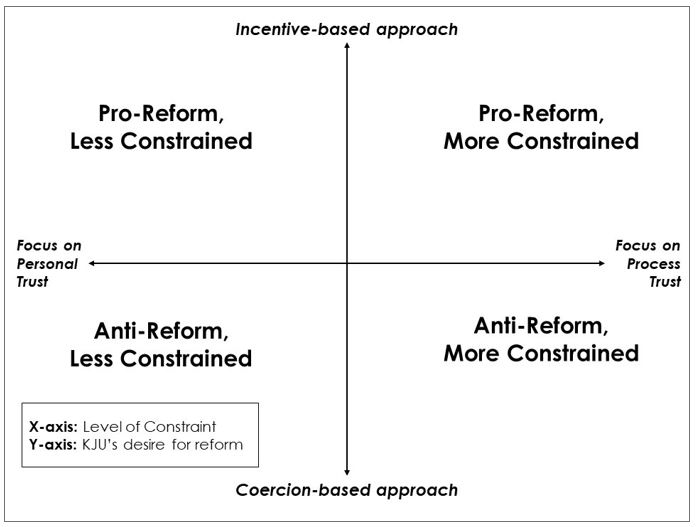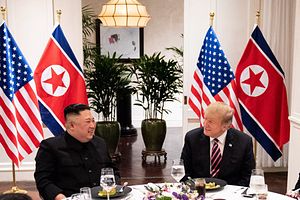There is no shortage of commentary on North Korea and ongoing diplomatic efforts with the Kim regime. Amidst the analysis and punditry, one can find innumerable suggestions and “concrete ways ahead” for dealing with Kim Jong Un. Some say that a “peace regime” and end-of-war declaration are necessary first steps toward North Korean reform. Others suggest that the North Korean government is simply playing by its old playbook and will only extort as much possible while giving nothing in return, so pressure and coercion are the only ways to get Kim to change course. Still others argue for a step-by-step approach with a mix of concessions and boundaries.
But who is correct? Perhaps the better question is, how can so many well-informed, intelligent people come to such different conclusions on how to proceed in negotiations with North Korea?
Taken strictly from a negotiator’s perspective, the differing opinions on how to engage with North Korea are attributable to a person’s answers to two critical questions. First, do you believe Kim Jong Un is pro-reform or anti-reform? Second, do you believe Kim Jong Un is more constrained in his governing power or less constrained?
I emphasize the word “believe” here because there is no way to confirm the answers to those questions; rather, they are assessments that vary based on the individual and their available data.
Therein lies the rub. Because these answers cannot be confirmed, it is possible that either of two people with vastly different conclusions on how to negotiate with Kim Jong Un could be correct, provided their beliefs of Kim’s constraints and view toward reform are the right ones.
The answers to those two questions inform rational negotiation strategies focused on incentive, coercion, process trust, and personal trust. The figure below represents this:

In short, if Kim Jong Un is pro-reform, incentives are more important than coercion, and if he is anti-reform, the opposite is true; if he is more constrained in his power, process trust is critical, while personal trust is more important if he is less constrained.
Of course, we must define “reform” and “constraints” in the context of North Korea. Reform means a break from the core precedents that Kim Il Sung and Kim Jong Il set during their reigns: policy positions such as a unified Korea under Kim regime rule; the nuclear weapons program; and the Orwellian system of information control and governance. Notably, economic reform is not included in this list of core precedents — North Korea could change its economy while still being intolerable to the international community in other ways (namely in the realms of security and human rights violations).
Constraints refer to internal institutional or political forces that prevent a government leader from taking desired policy actions. Many North Korea observers suggest that Kim Jong Un could do things with the swipe of his pen, which would imply he is less constrained (or unconstrained altogether). But a constrained Kim could potentially sign that same order but only after making concessions to opposition forces within his government and military.
With these definitions in mind, there are four potential circumstances to consider:
1) Pro-Reform, More Constrained
If Kim Jong Un is pro-reform but more constrained in his governing power, it means that he is now using diplomacy to break precedent from his father and grandfather but that he faces political and institutional constraints as to how far and how fast he can change things.
2) Pro-Reform, Less Constrained
In this case, Kim Jong Un wants to reform North Korea and has the power to do so. That means he has other requirements that he must gain from diplomacy; after all, if he did not, he could simply reform his country without having to negotiate with others. Instead, his principal goals from negotiation are to achieve other policy objectives, such as fostering independence from traditional partners like China or obtaining guarantees from the international community that his reforms will not backfire (such as another country invading or backing a coup if he relaxes security), among others.
3) Anti-Reform, More Constrained
If Kim Jong Un is opposed to reform but more constrained, it means he wants to keep the North Korean system the way it is, but he is now forced to use diplomacy to get sanctions relief to mollify potential opposition forces within his country. Failure to do so could impact his regime in negative ways, which is compelling him to pursue relief at the negotiating table.
4) Anti-Reform, Less Constrained
Under these circumstances, Kim Jong Un does not want change despite having the power to do so. Here, he would be freely choosing to use diplomacy as part of the old playbook in gaining concessions from traditional adversaries, though he could walk away at any moment if it seemed he would need to concede too much through negotiations.
Negotiating Principles and Approaches
Understanding these circumstances, the myriad rational negotiation approaches become clear. Let’s first examine the different negotiating principles. If Kim Jong Un is pro-reform, incentivization is important for building trust and reinforcing positive steps. Meanwhile, if he is anti-reform, coercion is necessary to force changes he does not want to make. If Kim is more constrained, process is critical to guide the broader North Korean government toward reform. This means things that decrease reliance upon individual decision-makers and ensure adherence to milestones for verification, accountability, and trust building. If Kim is less constrained, personal trust is the most critical aspect of negotiations, since he presumably has the power to affect change at will; thus, negotiating approaches should be directed at shaping his personal decision-making.
With those principles in mind, rational negotiation approaches for the four possible circumstances emerge:
1) Pro-Reform, More Constrained
Here, it is critical to incentivize reform, but because there are presumably forces within the North Korean government constraining Kim’s pro-reform agenda, process is critical to relieve internal pressure from the young dictator. Boundaries are as important as concessions here: negotiators cannot open the flood gates for aid or support, or they risk reinforcing the old Pyongyang playbook and empowering anti-reform forces in the North Korean government that argue reform is unnecessary because of the concessions they have already gained.
To manage these circumstances, a rational negotiation approach would seek to bring negotiations to the working level and employ a step-by-step, milestone-based process. The key is to allow that process to influence broader members of the North Korean government, to present rewards for milestones met, and to offer the Kim regime necessary decision space to exercise a pro-reform agenda despite internal forces that are opposed to it. Coercive tactics could be counterproductive, since they could potentially constrain Kim even further. As such, maintaining pressure is fair play, but increasing it could force Kim to shift away from the negotiating table toward alternatives.
2) Pro-Reform, Less Constrained
If Kim is open to reform and has the power to carry it out, the other side must determine his other interests besides sanctions relief. Is Kim looking for status among world leaders? Is he seeking an alternative to reliance upon China? What is it that he wants before he carries out reform?
Negotiators must determine Kim Jong Un’s broader interests and build negotiating positions that target them. Meanwhile, they should focus on building Kim’s trust so that he uses his power to execute reforms. Specific trust-building options include an end-of-war declaration and partial sanctions relief. Meanwhile, coercive tactics can erode trust and derail negotiations, so those should be avoided altogether.
3) Anti-Reform, More Constrained
In this circumstance, a country negotiating with North Korea must take advantage of Kim’s need for sanctions relief in order to gain concessions from his regime. Here, it is important to remember that incentives reinforce Kim’s anti-reform posture, since they are both concessions to someone who does not want to change and positive reinforcement of North Korea’s old diplomatic playbook.
The approach to North Korea here is simple: sanctions, sanctions, and more sanctions. If Kim Jong Un is at the table because he needs sanctions relief to manage domestic pressures, the approach is to amplify the impact of sanctions until he is forced to do something he does not want to do. Threats of walking away from the table and imposition of increased sanctions are tactics to try to garner North Korean concessions. At the same time, it becomes increasingly important to mitigate sanctions violations so that Kim does not have alternatives to the negotiating table.
4) Anti-Reform, Less Constrained
In this case, the country negotiating with North Korea must create a situation where diplomacy is the only off-ramp from escalating conflict. Remember that under this circumstance, Kim has the power to reform but is opting not to, which means he must personally be coerced to do something he does not want to do. Negotiators must also remember that incentives granted to Kim Jong Un are simply concessions with no hope for return-on-investment.
Here, the rational approach is to focus on coercion and Kim’s personal interests. Potential actions include issuance of threats to regime survival or consistent increase of pressure across the diplomatic, information, military, and economic spectrum. Negotiators should present nothing but hardline positions because presumably Kim retains the power to concede without facing internal opposition. Finally, negotiators should keep a strong BATNA (best alternative to negotiated agreement) available in case negotiating fails, which, by a rational estimation, is likely under these circumstances.
It is important also to note irrational approaches to negotiation with North Korea. Simply put, if an individual believes certain things with respect to Kim’s view towards reform and the constraints on his governing power but advocates negotiating approaches that would apply to different circumstances, it is irrational. For example, if someone believes Kim is anti-reform, focusing on incentives will not simply cause Kim to change his mind. Conversely, if someone believes Kim is pro-reform, advocating for increased pressure is counterproductive and could speed negotiations toward failure. From a negotiator’s perspective, it is important to ensure that negotiation strategies are aligned with assessments of the other side’s interests and constraints.
Given all this, it becomes apparent that each of the myriad opinions on how to approach the Kim regime could feasibly be rational and appropriate, but it all depends on those two critical factors of constraint and view toward reform. It also means that reconciling differing opinions will not occur until there is consensus-building on answers to those questions, because someone who believes Kim Jong Un is anti-reform cannot rationally agree with a negotiation approach for someone who believes Kim is pro-reform, etc. As such, arguing approaches to engagement is less important than providing clear-eyed assessments on Kim’s stance toward reform and his constraints. From a negotiator’s perspective, that is a far more imperative exercise for pundits and analysts out there.
Michael MacArthur Bosack is a seasoned international negotiator and an expert on Northeast Asian affairs. Currently, he is the Special Adviser for Government Relations at the Yokosuka Council on Asia-Pacific Studies. Previously, we was the Deputy Chief of Government Relations at Headquarters, U.S. Forces, Japan, where he served as a multilateral coordinator with counterparts from the Japanese and South Korean governments. Michael is a graduated East-West Center Fellow and military veteran.

































